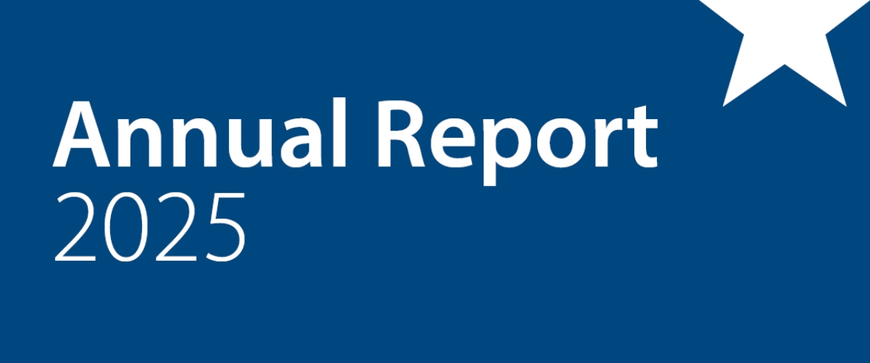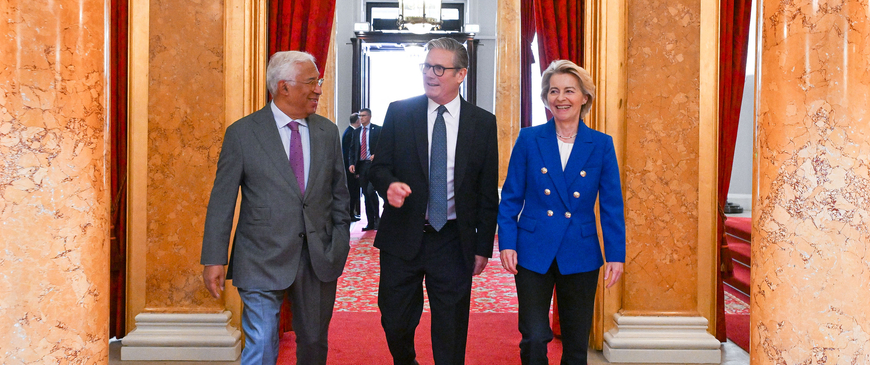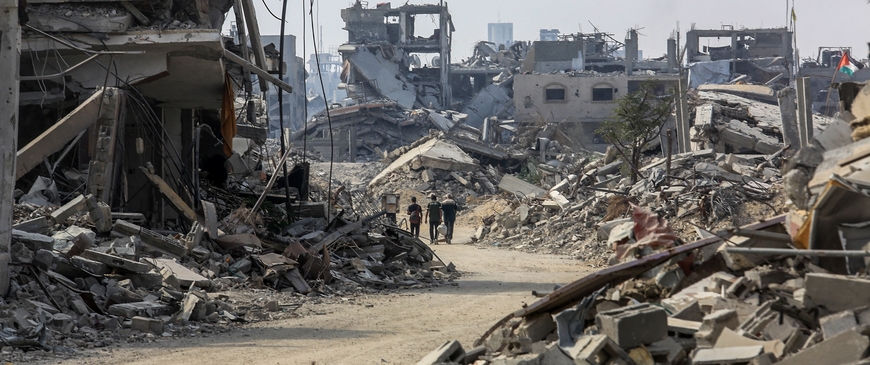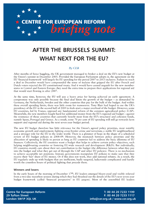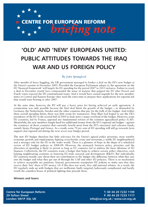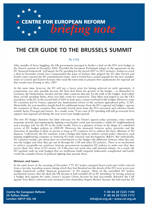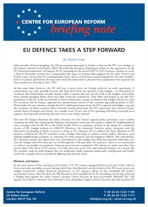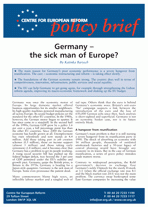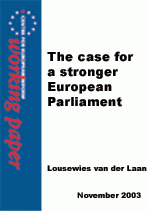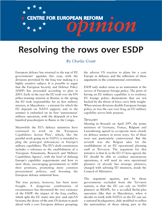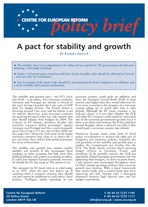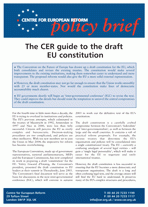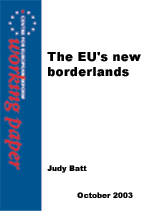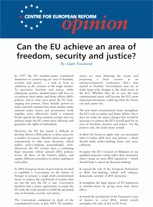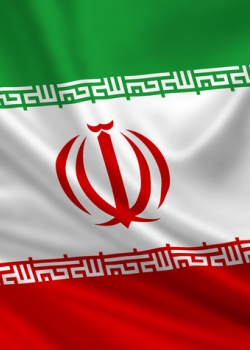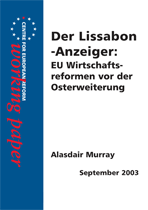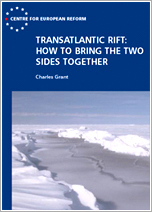Research
After the Brussels summit: What next for the EU?
16 December 2003
The manner and speed at which the Brussels European Council collapsed took most observers by surprise. Heads of state and government had arrived on the morning of Friday 12 December 2003, expecting negotiations to last until late on Sunday 14.
'Old' and 'New' Europeans united: Public attitudes towards the Iraq war and US foreign policy
11 December 2003
Is there a clear and lasting division between new and old Europe at the level of public opinion? This paper looks at public opinion polls conducted in the EU-15 countries and ten new members that will join the EU in 2004, to see which countries' populations supported the Iraq war before and after it took place.
The CER guide to the Brussels summit
05 December 2003
It is six months since the European Convention, a gathering of parliamentarians, government representatives and experts, presented its draft for an EU constitutional treaty. Since November, the EU governments – the current 15, plus the ten due to join on 1 May 2004 – have been negotiating a revision of this draft, in an 'inter-governmental conference' (IGC).
EU defence takes a step forward
05 December 2003
The deal struck between Britain, France and Germany on the future of European defence is good news for those who believe that the EU should focus more on military capabilities than institutions.
Germany – the sick man of Europe?
05 December 2003
Germany was once the economic motor of Europe. Its large domestic market offered business opportunities for its smaller neighbours. Its high-quality machines powered manufacturing all across Europe. Its sound budget policies set the standard for the other EU countries. In the 1980s, however, the German motor began to sputter. It...
Issue 39 - 2004
28 November 2003
- President Bush: Why you need the Europeans, Charles Grant, Steven Everts
- The EU and China, Katinka Barysch
- Three cheers for EU democracy, Alasdair Murray
Issue 33 - 2003
28 November 2003
- Is Europe working? , Katinka Barysch
- Should Britain hold a referendum on the EU Constitution?, Steven Everts and Charles Grant
- A joined-up EU security policy , Daniel Keohane and Adam Townsend
The case for a stronger European Parliament
07 November 2003
The EU urgently needs a stronger and reformed European Parliament (EP). With 60 per cent of all legislation affecting citizens' lives discussed in Brussels, EU decision-making must become more democratic.
Resolving the rows over ESDP
03 October 2003
European defence has returned to the top of EU governments’ agendas this year, with the divisions provoked by the Iraq war making it a highly sensitive subject. It is possible to argue that the European Security and Defence Policy (ESDP) has proceeded according to plan in 2003.
A pact for stability and growth
03 October 2003
The stability and growth pact – the EU’s fiscal rule book – is in tatters. The eurozone’s largest countries, Germany and France, are in breach of the pact, having exceeded the 3 per cent of GDP limit for budget deficits in 2002 and 2003. Theyare likely to do so again...
The CER guide to the draft EU constitution
03 October 2003
For the fourth time in little more than a decade, the EU is trying to overhaul its institutions and policies. The EU’s previous attempts, which culminated in the treaties of Maastricht in 1992, Amsterdam in 1997 and Nice in 2000, were less than fully successful. Citizens still perceive the EU...
The EU's new borderlands
03 October 2003
With the 2004 enlargement, the EU will acquire many new neighbours, some of them unstable states with fragile economies. This working paper explains why the regions along the EU's new eastern border matter for Europe's security.
Can the EU achieve an area of freedom, security and justice?
03 October 2003
In 1997 the EU member-states committed themselves to constructing an 'area of freedom, security and justice' – a task at least as ambitious as the creation of the single market.
If it's broken, fix it!
01 October 2003
Europeans are right to worry about their economy. Forecasters think that the eurozone economy will grow by a paltry 0.5 per cent this year. But the real problem is that Europe's sluggish performance is part of a long-term trend.
A clean break for Europe
01 October 2003
Europe needs to change. Those who constantly have to defend the concept of Europe against ill-informed criticism can easily slip into a defensive mode. But if we are serious about reform, we need to be on the front foot.
The EU must be tougher and more creative on Iran
01 October 2003
Iran is a test case for EU foreign policy. After the Iraq debacle, the EU faces a daunting challenge. The Union must demonstrate it can stay united under pressure; act tough when necessary; and persuade Washington to adjust its overall strategy.
Tensions between Tehran and the West have risen markedly in...
Tensions between Tehran and the West have risen markedly in...
Issue 32 - 2003
26 September 2003
- If it's broken, fix it! , Katinka Barysch
- A clean break for Europe , Nick Butler
- The EU must be tougher and more creative on Iran, Steven Everts
Der Lissabon-Anzeiger: EU Wirtschaftsreformen vor der Osterweiterung
05 September 2003
Als sich im März 2000 die EU-Staatschefs zum Gipfel in Lissabon versammelten, schien Europas Wirtschaft am Anfang eines neuen goldenen Zeitalters zu stehen. Die Wachstumsraten waren die höchsten seit nahezu einem Jahrzehnt.
Old Europe? Demographic change and pension reform
05 September 2003
US Defence Secretary Donald Rumsfeld was onto something when he classified the current EU countries as 'old Europe'. Germany, France and Italy together will have more than 70 million people over 60 in 2040. The fact that Europeans are leading longer, healthier lives is to be welcomed. The problem is...
Transatlantic rift: How to bring the two sides together
05 September 2003
The Iraq conflict divided the West into two hostile camps. The rifts that run across the Atlantic and among the Europeans show few signs of disappearing.

